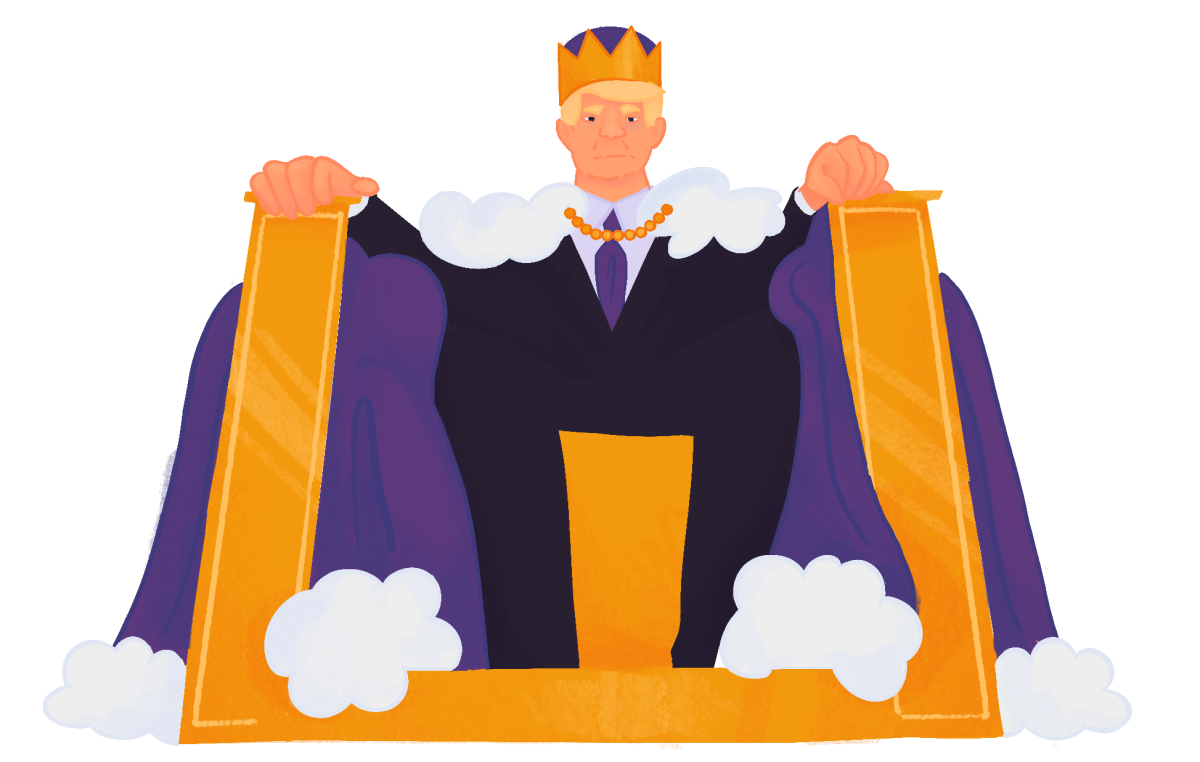In recent weeks, a flurry of controversial social media posts from government accounts have prompted debate about President Donald Trump’s emotive political rhetoric.
One post on the White House’s Instagram page was a video of a deportation flight, captioned as an ASMR post. Another post included an AI image depicting Trump in a crown, with the words “Long Live the King” below. Such posts have reinvigorated conversations about Trump’s unique approach to political speech.
History and economics teacher Jean Liao believes Trump intentionally differs his rhetoric from previous presidents, hoping to make waves in the political and social spheres.
“He purposely says things that are exaggerated for effect,” Liao said. “He looks to see if his comments got into the news, or got retweeted. He’s purposely choosing brash language because it sticks. He’s good at marketing.”
Junior Anvee Sharma sees a similar intrigue to Trump’s rhetoric and believes it sets him apart from other political figures.
“Some people might see him as someone who’s very honest with everyone. He doesn’t really have a filter,” Sharma said. “People kind of want that nowadays because politicians can be very fake. But at the same time, he can be extremely disrespectful, as we’ve seen on televised interviews.”
Liao believes that a disrespectful approach to politics has been embraced by many Americans in recent years, not just Trump himself.
“I feel like we’ve kind of gone back to the 2016 elections. People were saying his (Trump’s) hands were small, or saying, ‘Look at her (Hillary Clinton). She’s a hag,’” Liao said. “I think those are comments people might often say under their breath. We all know they are mean spirited and that they’re not helpful or productive. But now, I think people believe it’s more okay to say those things.”
Although some people are concerned by the increase in disrespectful political rhetoric, many voters see value in the candid statements Trump makes and inspires. Senior Sidak Sandhu believes Trump addresses issues more freely than other political figures.
“There’s certain things he (Trump) will do that no other politician will do, Republican or Democrat. It isn’t even about party lines. It’s about him,” Sandhu said. “To some extent, even if I don’t like how Trump talks about a lot of things, I’ll give him that much. He will talk about certain things no one else would.”
While Trump may offer a new approach to politics that relies less on tradition, Sharma believes there are still standards of behavior presidents should be expected to uphold.
“They (presidents) need to be poised. I’m not saying that they need to be elegant and professional all the time, but they should be someone the American public – and especially us as students – can look up to and be proud of,” Sharma said. “I feel like we’ve had a decline in that. A lot of people just don’t approve of the people that we’ve had in that powerful position.”
Sandhu believes in similar expectations for presidents. In particular, he questioned the idea that Trump’s more controversial statements are jokes or exaggerations.
“When you’re in a position like that (the presidency), you shouldn’t be making those jokes. You wouldn’t want someone with a gun to make jokes about shooting you,” Sandhu said. “When you’re in a position with that much power, you can’t make certain jokes one way or another. He shouldn’t be saying it.”
Although Trump’s rhetoric is highly controversial and sparks passionate debate on both sides, Liao believes his tone has little impact on actual political outcomes.
“There’s a lot more emotion involved (in politics now) but not necessarily more thoughtful participation in government,” Liao said. “The drama and the parade of laws and actions does cause some interest, but we get kind of tired. We have a new normal, with how much surprising news comes flying at us.”
As Sharma considers the next four years, she remains critical of the rhetoric Trump seems to be normalizing.
“In terms of politics and actually making a difference, I don’t really think it’s helping at all. It’s kind of making a mockery of the whole thing,” Sharma said. “It seems like he’s some random jokester, someone that people make fun of. I feel like, if you’re going to be the President of the United States, people shouldn’t think you’re acting like a meme.”


